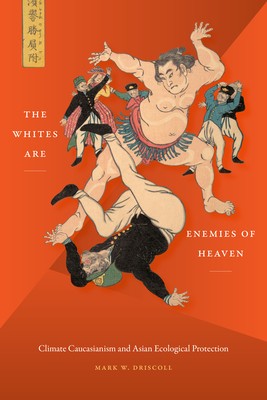
- We will send in 10–14 business days.
- Author: Mark W Driscoll
- Publisher: Duke University Press
- Year: 2021
- Pages: 384
- ISBN-10: 1478011211
- ISBN-13: 9781478011217
- Format: 15.2 x 22.9 x 2 cm, minkšti viršeliai
- Language: English
- SAVE -10% with code: EXTRA
Reviews
Description
In The Whites Are Enemies of Heaven Mark W. Driscoll examines nineteenth-century Western imperialism in Asia and the devastating effects of "climate caucasianism"--the white West's pursuit of rapacious extraction at the expense of natural environments and people of color conflated with them. Drawing on an array of primary sources in Chinese, Japanese, and French, Driscoll reframes the Opium Wars as "wars for drugs" and demonstrates that these wars to unleash narco- and human traffickers kickstarted the most important event of the Anthropocene: the military substitution of Qing China's world-leading carbon-neutral economy for an unsustainable Anglo-American capitalism powered by coal. Driscoll also reveals how subaltern actors, including outlaw societies and dispossessed samurai groups, became ecological protectors, defending their locales while driving decolonization in Japan and overthrowing a millennia of dynastic rule in China. Driscoll contends that the methods of these protectors resonate with contemporary Indigenous-led movements for environmental justice.
EXTRA 10 % discount with code: EXTRA
The promotion ends in 21d.16:59:26
The discount code is valid when purchasing from 10 €. Discounts do not stack.
- Author: Mark W Driscoll
- Publisher: Duke University Press
- Year: 2021
- Pages: 384
- ISBN-10: 1478011211
- ISBN-13: 9781478011217
- Format: 15.2 x 22.9 x 2 cm, minkšti viršeliai
- Language: English English
In The Whites Are Enemies of Heaven Mark W. Driscoll examines nineteenth-century Western imperialism in Asia and the devastating effects of "climate caucasianism"--the white West's pursuit of rapacious extraction at the expense of natural environments and people of color conflated with them. Drawing on an array of primary sources in Chinese, Japanese, and French, Driscoll reframes the Opium Wars as "wars for drugs" and demonstrates that these wars to unleash narco- and human traffickers kickstarted the most important event of the Anthropocene: the military substitution of Qing China's world-leading carbon-neutral economy for an unsustainable Anglo-American capitalism powered by coal. Driscoll also reveals how subaltern actors, including outlaw societies and dispossessed samurai groups, became ecological protectors, defending their locales while driving decolonization in Japan and overthrowing a millennia of dynastic rule in China. Driscoll contends that the methods of these protectors resonate with contemporary Indigenous-led movements for environmental justice.


Reviews